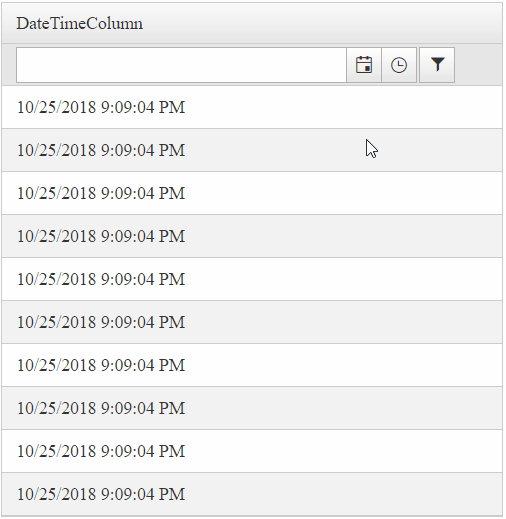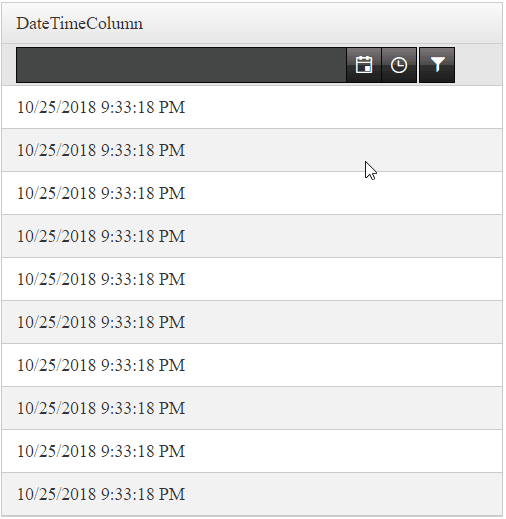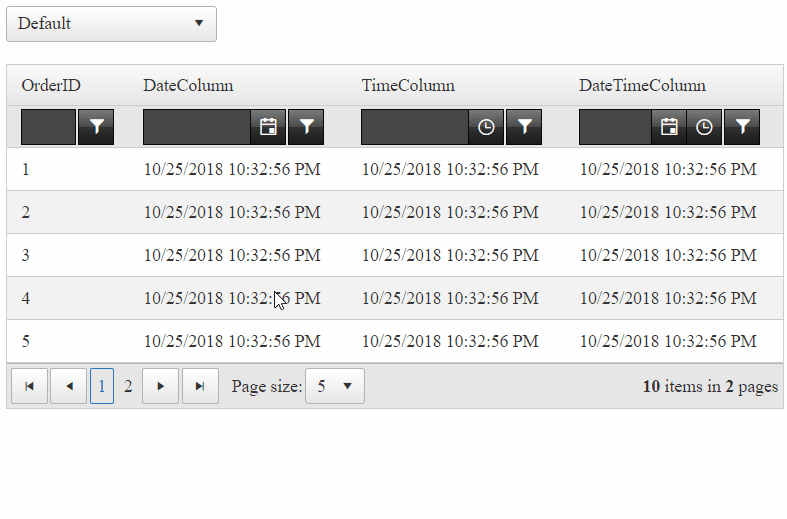Change the skin of built-in filter controls of RadGrid
How to
Change the skin of built-in filter controls of RadGrid, so that they will look different from the grid.
Before

After

Solution
Generally, this can be easily achieved by using templates. For example, defining a FilterTemplate:
<telerik:GridDateTimeColumn UniqueName="OrderDate" HeaderText="OrderDate" DataField="OrderDate">
<FilterTemplate>
<telerik:RadDateTimePicker ID="RadDateTimePicker1" runat="server" Skin="Black"></telerik:RadDateTimePicker>
</FilterTemplate>
</telerik:GridDateTimeColumn>In some cases, however, one would like to apply different skins to the built-in controls instead. It is no straight forward, since controls inside RadGrid inherit the grid's Skin and they will be styled in accordance to that.
Here is how it's done:
RadGrid defines the skin/styling to controls in the PreRender event, therefore, we will be overriding that using the Page_PreRenderComplete event.
Page_PreRenderComplete event handler
protected void Page_PreRenderComplete(object sender, EventArgs e)
{
////Execute logic only if Filtering is enabled and Filter type is Classic or Combined. These two options have FilterItem.
if (RadGrid1.AllowFilteringByColumn && RadGrid1.FilterType == GridFilterType.Classic || RadGrid1.FilterType == GridFilterType.Combined)
{
// Access the Filtermenu and apply the skin on it
RadGrid1.FilterMenu.Skin = "Black";
// Reference to the filterItem
GridFilteringItem filterItem = RadGrid1.MasterTableView.GetItems(GridItemType.FilteringItem)[0] as GridFilteringItem;
// Loop through all the columns (that are to be rendered) of RadGrid
foreach (GridColumn col in RadGrid1.MasterTableView.RenderColumns)
{
if (col is GridNumericColumn) // checking if the column is of type GridNumericColumn
{
RadNumericTextBox numericTextBox = filterItem[col.UniqueName].Controls[0] as RadNumericTextBox;
numericTextBox.Skin = "Black";
}
else if (col is GridDateTimeColumn) // checking if the column is of type GridDateTimeColumn
{
// DateTime columns might have different controls depending on the column's PickerType property
// if its DatePicker
RadDatePicker datePicker = filterItem[col.UniqueName].Controls[0] as RadDatePicker;
if (datePicker != null)
{
datePicker.Skin = "Black"; // sets the Picker button's skin to Black
datePicker.DateInput.Skin = "Black"; // sets the Input/Textbox's skin to Black
datePicker.SharedCalendar.Skin = "Black"; // sets the Calendar's skin to Black
}
// if its DateTimePicker
RadDateTimePicker dateTimePicker = filterItem[col.UniqueName].Controls[0] as RadDateTimePicker;
if (dateTimePicker != null)
{
dateTimePicker.Skin = "Black"; // sets the Picker button's skin to Black
dateTimePicker.DateInput.Skin = "Black"; // sets the Input/Textbox's skin to Black
dateTimePicker.SharedCalendar.Skin = "Black"; // sets the Calendar's skin to Black
/*
TimeView is a little different, we will replace the built-in with an custom one
*/
// Create a TimeView
RadTimeView newTimeView = new RadTimeView()
{
TimeFormat = "HH:mm:ss",
StartTime = new TimeSpan(0, 0, 0),
EndTime = new TimeSpan(24, 0, 0),
Interval = new TimeSpan(1, 0, 0),
Skin = "Black"
};
// Add the TimeView control to the Cell's controls collection
dateTimePicker.Parent.Controls.Add(newTimeView);
// Set the shared TimeViewID to the new one
dateTimePicker.SharedTimeViewID = newTimeView.ID;
// set the SharedTimeView of the picker to be the new one
dateTimePicker.SharedTimeView = newTimeView;
}
// if its TimePicker
RadTimePicker timePicker = filterItem[col.UniqueName].Controls[0] as RadTimePicker;
if (timePicker != null)
{
timePicker.Skin = "Black"; // sets the Picker button's skin to Black
timePicker.DateInput.Skin = "Black"; // sets the Input/Textbox's skin to Black
// Create a TimeView
RadTimeView newTimeView = new RadTimeView()
{
TimeFormat = "HH:mm:ss",
StartTime = new TimeSpan(0, 0, 0),
EndTime = new TimeSpan(24, 0, 0),
Interval = new TimeSpan(1, 0, 0),
Skin = "Black"
};
// Add the TimeView control to the Cell's controls collection
timePicker.Parent.Controls.Add(newTimeView);
// Set the shared TimeViewID to the new one
timePicker.SharedTimeViewID = newTimeView.ID;
// set the SharedTimeView of the picker to be the new one
timePicker.SharedTimeView = newTimeView;
}
}
}
}
}It is not done yet, though! Assuming that, RadGrid will request the CSS Stylesheets for the Default Skin.Our controls will not have black unless we register them individually. For that purpose, we will request the necessary styles using RadStyleSheetManager.
<telerik:RadStyleSheetManager EnableStyleSheetCombine="false" runat="server">
<StyleSheets>
<%--Black Skin for the Input controls (RadInput)--%>
<telerik:StyleSheetReference Assembly="Telerik.Web.UI.Skins" Name="Telerik.Web.UI.Skins.BlackLite.Input.Black.css" />
<%--Black Skin for the RadGrid FilterMenu (RadMenu) control--%>
<telerik:StyleSheetReference Assembly="Telerik.Web.UI.Skins" Name="Telerik.Web.UI.Skins.BlackLite.Menu.Black.css" />
</StyleSheets>
</telerik:RadStyleSheetManager>Well done! The RadTimePicker, RadDatePicker and RadDateTimePickers controls now have the Black Skin.
There is one last thing we need to style. That is the Filter button residing next to the FilterControl. This button is a Web Control of type ElasticButton has no Skin property to assign one. RadGrid will style that by default, but, if you want to change the Style, you will need to override some of the CSS classes. To complete our scenario, we will be styling them same as in the Black skin. We've used some of the CSS rules that come with the RadGrid_Black stylesheet when the Grid's Skin is set to Black.
/*
style the buttons near the filter controls
The rules from below have been taken from the "RadGrid_Black" CSS file
*/
.RadGrid .rgFilterRow .rgFilter:hover,
.RadGrid .rgFilterRow .rgFilter:focus {
border-color: black;
color: #fff;
background-color: #020202;
background-image: linear-gradient(#5c5c5c,#2a2a2c 50%,#060606 50%,#020202);
box-shadow: none;
}
.RadGrid .rgFilterRow .rgFilter {
border: 1px solid;
border-color: #080808;
color: #fff;
background-color: #1b1b1b;
background-image: linear-gradient(#7b7b7b,#4a4a4a 50%,#313131 50%,#1b1b1b);
box-shadow: none;
}
.RadGrid .rgFilterRow button.rgActionButton {
color: white;
}
.RadGrid .rgFilterRow .rgFilterActive,
.RadGrid .rgFilterRow .rgFilterActive:hover,
.RadGrid .rgFilterRow .rgFilterActive:focus {
border-color: #070707;
color: #9eda29;
background-color: #202020;
background-image: linear-gradient(#6e6e6e,#2b2b2d 50%,#050505 50%,#202020);
box-shadow: inset 0 0 6px rgba(165,165,165,0.5);
}Congratulations!
You've successfully changed the skins of the Built-in FilterControls in RadGrid. It wasn't that difficult after all, was it?
